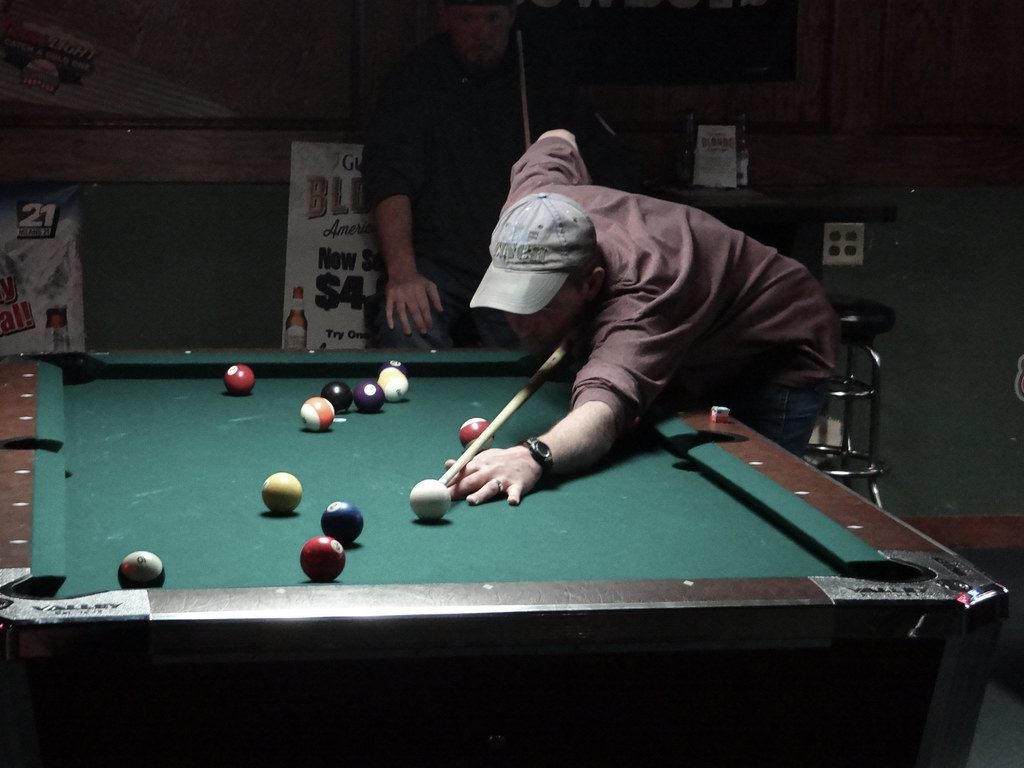I have the opportunity to play pool with some folks that I’ve never played pool with before and so I thought it would be timely to share my ruminations on the pool rules I’ve experienced in the US and the rules I recommend for friendly games.
Bar Pool Rules
The default that I’ve seen in most bars in the US is that you shoot 8-ball and you have to call every shot. If you call it off of another ball and it goes in without touching that ball, it is still a miss and you’re giving up control of the pool table. This can lead to debates on whether what actually happened adequately matches what was called. Compared to other alternatives there is a much higher chance of rules arguments like this. Those debates are not fun for me. It also feels pretty unforgiving and not what I’d want for a friendly game of pool.
Accepting Slop
The next logical alternative from bar pool is what I’ve heard called slop pool. As long as your ball goes in it doesn’t matter whether it was what you intended to have happen. This leads to a much more relaxed game and there’s nothing to argue about, which is a huge relief. But it earned the name of slop pool for a reason: it isn’t very competitive and it is would be nice to have some rules to avoid games that go on forever with defensive battles no one can win.
APA League Rules
So if bar pool is too unforgiving and slop pool is too loosey-goosey, is there a good balance? Yes! I present to you: the APA 8-ball rules. You can find these rules online in various forms, but here is my summary:
- You lag for the break. You don’t have to follow this religiously, but it doesn’t hurt to practice.
- While the table is open, you can hit any ball first. Once you are solids or stripes, you have to hit one of your balls first.
- If you hit your opponent’s ball first it is a foul. If you don’t send a ball to the rail after hitting your own ball, it is a foul.
- Fouls and scratches are ball in hand for the other player. They can put the ball anywhere: there is no “kitchen” to be locked in.
- Beyond that, it is much like “slop” until you get to the 8. You must mark the pocket where the 8 will go. Do not ever forget to mark your pocket. Pick a trinket that isn’t the chalk and make it your pocket marker.
After playing way too much pool I’ve really found this to be a nice blend of low BS yet challenging with some reasonable limits. The ball in hand stuff can take some adaption coming from playing typical bar pool, but it shows up in other games like 9 ball. Having ball in hand and not being locked in the kitchen limits how long defensive battles can slog on for.

(image from https://live.staticflickr.com/7286/16562522470_b96eed0f0f_b.jpg under CC BY-NC-SA 2.0.)
Whether you’re interested in playing league pool or not, these rules are a fun balance. There is always a chance that you will find this fun is something you’ll want to get more of and so you might consider joining your local APA league. Another advantage of the APA rules, is that pool halls often use them for their weekend tournaments. You usually need to pay a small fee to participate in the tournament, but often you don’t need to be a regular league player to participate. This can be a fun way to play against serious players without committing to the weekly time and expense of joining the league. Don’t be surprised if teams try to recruit you.
Beyond 8 ball
We’ve focused on 8-ball so far because that is the pool that most people I’ve run into are used to. But there are a myriad of other options that appear in pool tournaments and can be fun for us to play who aren’t at that level. One of the things that can be less fun with 8-ball is when two players are vastly different levels. The better player will get most of their balls out of the way in short order and the learning player is left feeling defeated because you’re so far behind the player that has already pocketed most of their balls. 9-ball addresses this pretty efficiently. You’re never behind in 9-ball. Whoever is shooting must hit the low ball on the table first or it is a foul. If one player gets most of the balls in, it doesn’t matter. It is helping both players get closer to the winning ball. This helps keep it fun and leads to faster games. 9-ball also encourages you to focus on where the cue ball is going to end up. That is a good skill for any pool game.
Conclusion
I hope you’ll give APA 8-ball a try. Let me know if you’ve got some time to play a game.